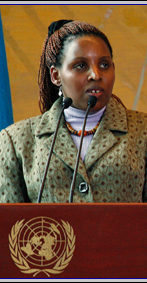Eugenie Mukeshimana

Topics
Topics Include:
- The 1994 genocide against Tutsis in Rwanda (personal account)
- Gender role and the Genocide
- The media and the Genocide
- Survivorship: Coping with loss & grief
- Post-genocide Justice, Reconciliation, Faith and Forgiveness
- Managing PTSD among survivors and eye witnesses
- Genocide survivors immigration and resettlement experiences in America
- Genocide Education program development
- Overcoming survivorship: transformation from a survivor to an achiever
- Using your life experience to make a difference
Biography
Eugenie Mukeshimana is one of a few women social entrepreneurs who transformed the country of Rwanda. She has helped put her country at the head of all nations with the most female representatives in the government.
In the aftermath of the 1994 Genocide against Tutsis, Eugenie had no other choice but to rebuild her life from the scratch. The responsibility of raising her newborn daughter as a single mother, gave her an incentive to rise above and beyond survivorship. With her vision as a Social entrepreneur, she is a pioneer of privately owned Waste Management and Sanitation Service companies in Rwanda where she founded and managed Kigali Cleaning Services to tackle environmental, sanitation, and waste management problems in the city of Kigali while creating jobs for hundred of unemployed women in the city. Operating under its new name COPED Group, the company she founded over ten years ago continues to grow and has recently opened the first plastics recycling plant in Rwanda.
In 2001, Eugenie moved to the USA to start a new life journey. She attended The College of St. Rose in Albany, New York, where she earned a Bachelor’s of Science Degree in Social Work. Shocked by the lack of knowledge about the genocide among her classmates and teachers, Eugenie began to publicly speak about her experiences during the genocide Eight years later, her story has been heard by thousands of students and community members throughout the country.
From listening to hundreds of teachers and students she met through her public appearances, Eugenie learned of a growing desire among students to learn more about the world outside their country�s borders. It is in response to their demands that Eugenie recently created a social enterprise company with a vision to develop an oral tradition-based lesson plans module to reactivate interest in global education, and contribute to global learning by facilitating development, access and distribution of education materials to educators and students worldwide. Eugenie also provides cross-cultural sensitivity training to human service providers.
Eugenie’s innovative approach to reintroduce story telling and sharing is a viable mechanism to broaden our understanding of the world we inhabit, curb biases about the “others,” and celebrate all colors of humanity.
Eugenie has a combined experience of over 14 years in the Social Services mainly working with displaced families both in Rwanda and the USA. She is also a frequent panelist on issues of genocide, conflict transformation, community rehabilitation, trauma and grief counseling.
“It was right after your story that I told myself I would join the STAND chapter at Ramsey. In school, we are not told of the severity of these events — they are merely said as an afterthought and never put in the forefront of our studies. But your story was enlightening (and terribly, terribly saddening). I truly wish to be involved in STAND and other efforts my school organizes to combat genocide, and I owe it all to you and your story.” –Ramsey High School student
“It is truly a transformative experience for the teachers and students who attend, and I can wholeheartedly say that it was a most worthwhile experience for our entire Farmingdale High School community.” — Garner Bass, Director of Social Studies, Farmingdale Public Schools, NY
“I had the privilege to attend the 59th Annual DPI/NGO Conference, UN Headquarters, NYC last fall. One speaker that really impressed me was a 1994 Rwanda genocide survivor, Eugenie Mukeshimana. She spoke of gender-based violence against women in conflict regions and empowerment in the post-conflict period.” — Virginia J. Schlicher, Australia
“You made me realize that life is what you make it, and to live my life the best way I can, Now I see I can change the way I live no matter what I have done, that my life is to be lived happily.” — Marvin C., recovering drug addict